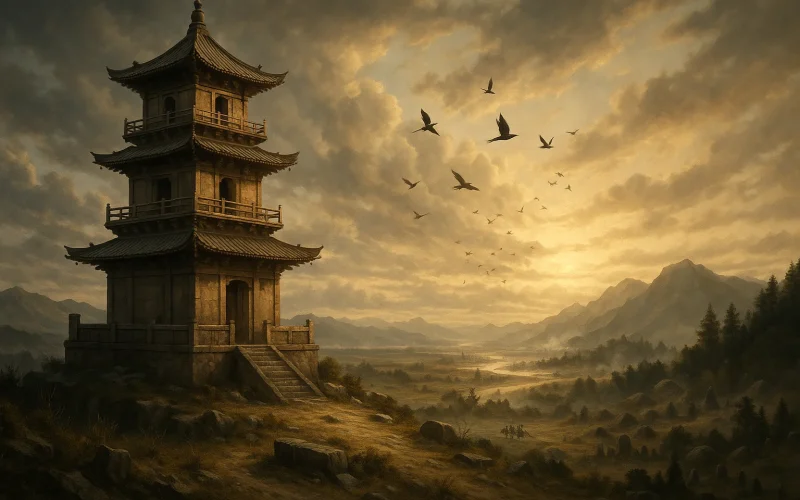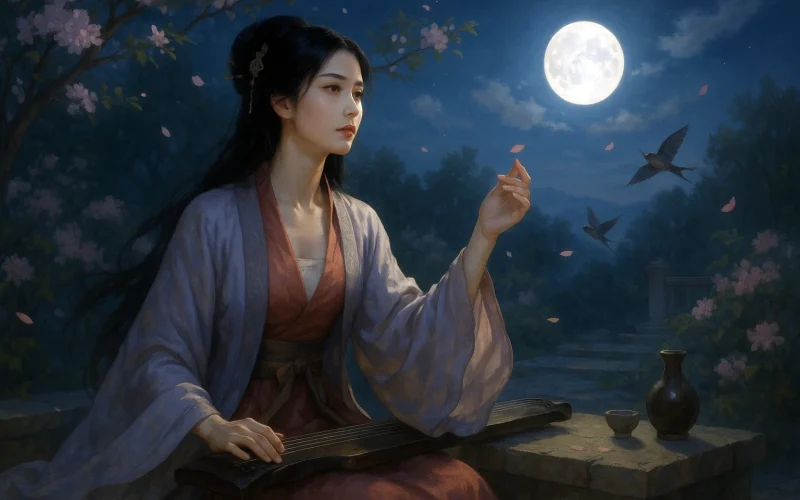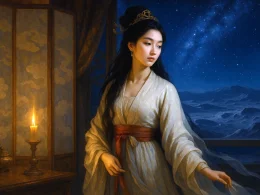The hundred-foot-high tower proud
Commands superb views far and nigh.
At dusk it's crowned with drowsy cloud,
At dawn around it birds will fly.
Mountain on mountain, stream on stream,
All come in sight with boundless plain.
Heroes of yore with smile would beam
To win victory and glory vain.
They would die in a hundred years
And lie buried then underground.
Cypress or pine felled disappears,
Lofty tomb leveled down to mound.
A fallen empire has no heir,
Where could the roaming soul be found?
Glory is a castle in the air;
There is no hero but death-bound!
Original Poem
「拟古 · 其四」
陶渊明
迢迢百尺楼,分明望四荒。
暮作归云宅,朝为飞鸟堂。
山河满目中,平原独茫茫。
古时功名士,慷慨争此场。
一旦百岁后,相与还北邙。
松柏为人伐,高坟互低昂。
颓基无遗主,游魂在何方?
荣华诚足贵,亦复可怜伤!
Interpretation
Composed in 421 AD when Tao Yuanming was fifty-seven years old, this poem was written shortly after Liu Yu usurped the Eastern Jin throne and established the Liu Song dynasty. Amidst this dynastic upheaval, though long retired to rural seclusion, Tao reflects profoundly on the vanity of worldly achievements and historical vicissitudes. Through the imaginary act of ascending a tower, the poem meditates on life's transience and affirms his unwavering commitment to reclusive living.
First Couplet: "迢迢百尺楼,分明望四荒。"
Tiáo tiáo bǎi chǐ lóu, fēn míng wàng sì huāng.
The soaring hundred-foot tower high, Commands clear view of wastes that lie.
This imagined vertical perspective establishes both physical vantage point and philosophical framework for subsequent reflections.
Second Couplet: "暮作归云宅,朝为飞鸟堂。"
Mù zuò guī yún zhái, zhāo wèi fēi niǎo táng.
Dusk transforms it to clouds' retreat, Dawn makes hall for winged flocks' meet.
The diurnal metamorphosis of the tower mirrors impermanence in human affairs through celestial and avian symbolism.
Third Couplet: "山河满目中,平原独茫茫。"
Shān hé mǎn mù zhōng, píng yuán dú máng máng.
Peaks and rivers fill the eye's domain, While the plain dissolves in formless plain.
Spatial contrast between defined topography and undifferentiated expanse mirrors the tension between historical permanence and individual transience.
Fourth Couplet: "古时功名士,慷慨争此场。"
Gǔ shí gōng míng shì, kāng kǎi zhēng cǐ chǎng.
Those ancient seekers of renown, With fervor strove to claim this ground.
Introduces historical actors whose passionate worldly struggles now serve as object lessons.
Fifth Couplet: "一旦百岁后,相与还北邙。"
Yī dàn bǎi suì hòu, xiāng yǔ huán Běi máng.
When their century's span was through, To Beimang's graves they all withdrew.
The leveling democracy of death renders all worldly achievements equally ephemeral.
Sixth Couplet: "松柏为人伐,高坟互低昂。"
Sōng bǎi wéi rén fá, gāo fén hù dī áng.
Pines once marking tombs now felled, Mounded graves in ruin held.
Even funerary monuments to greatness succumb to time's indifferent erosion.
Seventh Couplet: "颓基无遗主,游魂在何方?"
Tuí jī wú yí zhǔ, yóu hún zài hé fāng?
Crumbled platforms lack their lord—Where wanders now the spirit's chord?
Rhetorical questioning underscores the ultimate unknowability of posthumous existence.
Eighth Couplet: "荣华诚足贵,亦复可怜伤!"
Róng huá chéng zú guì, yì fù kě lián shāng!
Though glory seems reward most dear, How pitiful its end appears!
The devastating epigram delivers Tao's final judgment on temporal ambition through perfect tonal counterpoint.
Holistic Appreciation
This philosophical masterpiece employs the "tower ascent" motif to survey human existence across temporal and spatial dimensions. Beginning with commanding views of nature's permanence, it contrasts ancient achievers' passionate struggles with their inevitable oblivion. The ruined tombs and unanswered questions about wandering souls underscore life's ephemeral nature through concrete imagery. Tao's concluding lament about worldly glory's ultimate worthlessness powerfully reaffirms his rejection of officialdom and embrace of rural seclusion, crystallizing his philosophical worldview through poetic economy.
Artistic Merits
The poem progresses through meticulously structured layers—from physical observation to historical reflection to metaphysical questioning. Natural imagery (clouds, birds, mountains) embodies abstract concepts through tangible symbols, while rhetorical questions deepen the philosophical inquiry. The closing exclamation crystallizes Tao's worldview with devastating simplicity, demonstrating his mastery of understatement. Spatial contrasts between the tower's height and the plain's expanse create visual tension that reinforces thematic concerns.
Insights
Tao's vision transcends its historical moment to address universal human conditions. His tower becomes a metaphor for enlightened perspective—true understanding reveals the vanity of worldly competition. The poem challenges contemporary readers to consider what endures beyond material achievements and to find value in non-conformist, principled living. Particularly relevant in achievement-oriented societies, it reminds us that authentic fulfillment comes from inner integrity rather than external validation, urging reexamination of conventional success metrics through historical consciousness.
Poem translator
Xu Yuanchong (许渊冲)
About the poet

Tao Yuanming(陶渊明), 365 – 427 CE, was a poet, literary figure, fu writer, and essayist active during the late Eastern Jin and early Liu Song dynasties. Born in Chaisang (near present-day Jiujiang, Jiangxi Province), he pioneered a new genre of pastoral-themed literature, expressing profound philosophical insights through simple language. His poetic style became an enduring aesthetic standard in classical Chinese poetry.











